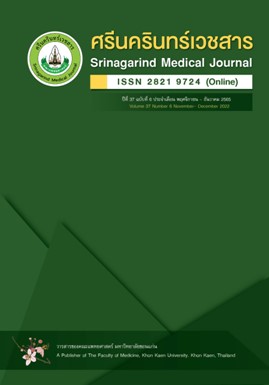ประสิทธิผลของระบบการดูแลผู้มีปัญหาสุขภาพจิตจากสถานการณ์การแพร่ระบาดของโรคติดเชื้อโควิด-19 วิถีใหม่
The Effectiveness of the New Normal of Care System for People with Mental Health Problems from COVID-19 Pandemic
Abstract
หลักการและวัตถุประสงค์: การแพร่ระบาดของโรคติดเชื้อโควิด-19 ส่งผลกระทบต่อกาย ใจ สังคม กรมสุขภาพจิตจึงมีนโยบายและแผนดำเนินการเพื่อดูแลผู้มีปัญหาสุขภาพจิตจากสถานการณ์การแพร่ระบาดโรคติดเชื้อโควิด-19
วิธีการศึกษา: เป็นการศึกษาประเมินผลตามกรอบแนวคิด CIPP model ใช้วิธีผสมผสานเชิงคุณภาพเป็นหลักและเชิงปริมาณเป็นรอง กลุ่มตัวอย่างทั้งหมด 303 ราย เป็นผู้ให้ข้อมูลหลักเพื่อสัมภาษณ์เชิงคุณภาพ 55 ราย และผู้รับบริการ 248 ราย โดยแบบสอบถามเชิงปริมาณ ใช้การวิเคราะห์เนื้อหาและสถิติเชิงปริมาณเป็นค่าเฉลี่ย ร้อยละ
ผลการศึกษา: กลุ่มตัวอย่างเป็นเพศหญิง ส่วนใหญ่อายุเฉลี่ย 30 ปี สถานภาพสมรส การศึกษาระดับปริญญาตรี รับราชการมากกว่าครึ่งหนึ่ง รายได้เพียงพอ ด้านบริบทพบว่าในช่วงวันที่ 1 พ.ค. 63 ถึง 31 มี.ค. 65 มีผู้ประเมินตนเองโดยใช้ mental health check in พบความเครียดร้อยละ 7.65 ภาวะซึมเศร้าร้อยละ 9.07 เสี่ยงฆ่าตัวตายร้อยละ 5.01 ระบบดูแลสุขภาพจิตมีประสิทธิผลด้านการบูรณาการกายจิตสังคม ผ่านศูนย์ปฏิบัติการภาวะฉุกเฉิน การสื่อสารปัญหาสุขภาพจิตสู่ผู้ปฏิบัติไม่ชัดเจน ไม่ครอบคลุม ไม่ทั่วถึง ขาดการสนับสนุนงบประมาณและอัตรากำลังด้านสุขภาพจิต บุคลากรระดับปฐมภูมิยังขาดทักษะการดูแล การประชาสัมพันธ์การรอบรู้สุขภาพจิตและเข้าใจระบบการดูแลยังไม่เพียงพอ มุ่งเน้นการดำเนินงานฝ่ายกายมากกว่าจิต ประชาชนที่มีปัญหาสุขภาพจิตได้รับการคัดกรองและให้คำปรึกษาทางโทรศัพท์ แต่การติดตามต่อเนื่องมีน้อยและไม่ต่อเนื่อง อย่างไรก็ตามความพึงพอใจของผู้รับบริการอยู่ในเกณฑ์ดี และมีความต้องการข้อมูลแหล่งติดต่อขอความช่วยเหลือเมื่อเกิดวิกฤต ประสิทธิผลของการเข้าถึงการดูแลเป็นตามเป้าหมายยกเว้นอัตราการฆ่าตัวตายที่เพิ่มขึ้น
สรุป: จากการประเมินพบว่าระบบมีประสิทธิผลด้านนโยบายบูรณาการสุขภาพสังคม การใช้การประเมินออนไลน์ผสมกับการดูแลสุขภาพจิตทางไกล และควรมีการประเมินผลในระยะยาวต่อไป
คำสำคัญ: โรคโควิด-19, ปัญหาสุขภาพจิต, ระบบการดูแลสุขภาพจิต
Abstract
Background and Objective: The COVID-19 outbreak has a tremendous impact on physical, mental and social wellbeing. The department of mental health has developed a policy and plan of care system for people with mental health problems from the pandemic situation.
Methods: The evaluation research on the system effectiveness using CIPP model, mixed methods focusing on qualitative and quantitative methods respectively, was conducted with total study population (n=303) divided by 55 samples using in-depth interview and 248 samples using the online questionnaire. The content analysis and descriptive statistics were used for analyzing data.
Results: The study samples were mostly female, mean age 30 years, married, undergraduate education and having regular income. From context domain, people using mental health check in assessment of their mental status during May 1st 2020 - March 31st 2021 were found to have stress risk 7.65%, depression 9.07% and suicidality 5.01%. Psychosocial care system was well- implemented in the policy under the provincial Emergency Operation Center.From input domain, there were not enough mental health communication in a policy level and few budgets were allocated for crisis mental health service. The inadequate quantity and capacity of mental health professional has affected the care process due to overwhelming physical issues. Overall, the system was effective, most were mental health check in application screening, telephone counseling and the health professional care consequently. Most outcome indicators were achieved. Despite the crisis care, increasing suicide rate suggest the ongoing surveillance on this issue.
Conclusion: The effectiveness system was on the holistic care policy, the self-assessment application and the service from mental team. There is a need for evaluation on the long-term impact of COVID-19 on the psychosocial recovery.
Keywords: COVID-19, mental health problems, mental health care system


